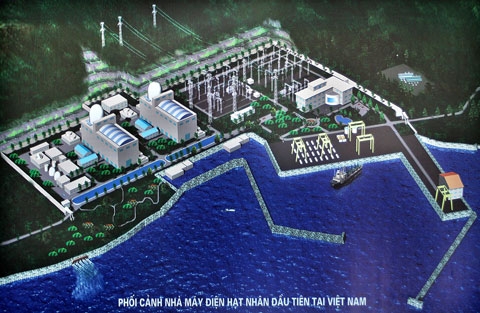Russia and Vietnam together boost nuclear power cooperation
 Kardo-Sysoev Alexander, senior specialist of the trade representation of the Russia of Russian Federation in Vietnam, last week told VIR that Ninh Thuan Nuclear Power Project Management Board, a subsidiary under Vietnam Electricity with responsibilities for preparation for and management of Ninh Thuan 1 nuclear power project, was in the process of recruiting a foreign consultant to develop a feasibility study and site approval dossier of the project in accordance with the current regulations of Vietnam.
Kardo-Sysoev Alexander, senior specialist of the trade representation of the Russia of Russian Federation in Vietnam, last week told VIR that Ninh Thuan Nuclear Power Project Management Board, a subsidiary under Vietnam Electricity with responsibilities for preparation for and management of Ninh Thuan 1 nuclear power project, was in the process of recruiting a foreign consultant to develop a feasibility study and site approval dossier of the project in accordance with the current regulations of Vietnam.
After the feasibility study and site approval dossier are completed by the consultant, they will have to go through an approval process by relevant Vietnamese authorities before Vietnam Electricity can proceed with negotiation of EPC contract with Russian EPC contractor.
"The Russian company issued $8 billion credit policy for Ninh Thuan 1 nuclear power project and the Vietnamese company is considering the technology and business research substantiation for the construction which will be completed in next January," said Alexander.
The Russian partner's role is to provide state credit to the project, support Vietnam in human resource training, supply nuclear fuel on stable and long-term basis to the plant, and take care of spent fuel treatment.
Construction of Ninh Thuan 1 nuclear power project is scheduled by the end of 2014, so that commercial operation of the first unit can begin before the end of 2020.
Ninh Thuan 1 includes two units with total capacity of 2,000 megawatts. The first unit, with capacity of 1,000 megawatts, will be put into the operation in 2020 and second unit will be completed one year later.
It is estimated that nuclear power will generate about 7.8 per cent of Vietnam's power demand in 2030.
Ninh Thuan 1, the first project of its kind in Vietnam, is expected to propel other nuclear power projects in Vietnam. According to Vietnam's Seventh Power Master Plan, there are plans for ten nuclear power plants with an installed capacity of 10,700 megawatt by 2030.
Nuclear power, while carrying its own environmental risks, is widely perceived as a cleaner source of energy than fossil fuels, the burning of which release carbon dioxide and contribute to climate change.
Eight sites in central Vietnam are being considered as location for potential nuclear power plants, including locations in Ninh Thuan, Binh Dinh, Phu Yen, Ha Tinh and Quang Ngai provinces.
What the stars mean:
★ Poor ★ ★ Promising ★★★ Good ★★★★ Very good ★★★★★ Exceptional
Related Contents
Latest News
More News
- MAE names big 10 policy wins in 2025 (February 06, 2026 | 08:00)
- US firms deepen energy engagement with Vietnam (February 05, 2026 | 17:23)
- Vietnam records solid FDI performance in January (February 05, 2026 | 17:11)
- Site clearance work launched for Dung Quat refinery upgrade (February 04, 2026 | 18:06)
- Masan High-Tech Materials reports profit: a view from Nui Phao mine (February 04, 2026 | 16:13)
- Hermes joins Long Thanh cargo terminal development (February 04, 2026 | 15:59)
- SCG enhances production and distribution in Vietnam (February 04, 2026 | 08:00)
- UNIVACCO strengthens Asia expansion with Vietnam facility (February 03, 2026 | 08:00)
- Cai Mep Ha Port project wins approval with $1.95bn investment (February 02, 2026 | 16:17)
- Repositioning Vietnam in Asia’s manufacturing race (February 02, 2026 | 16:00)

 Tag:
Tag:



















 Mobile Version
Mobile Version